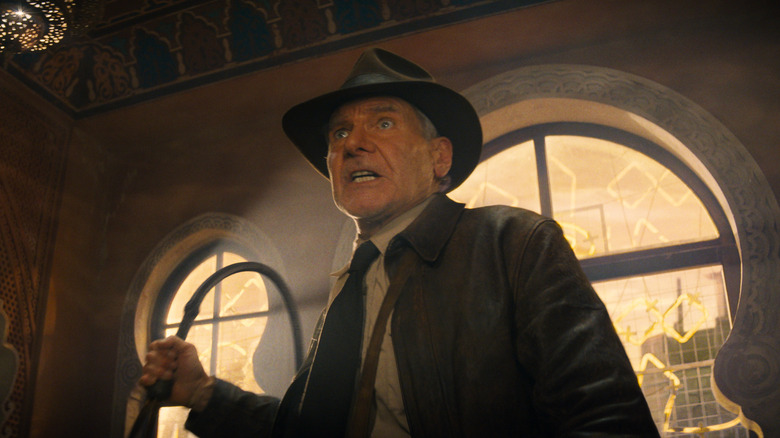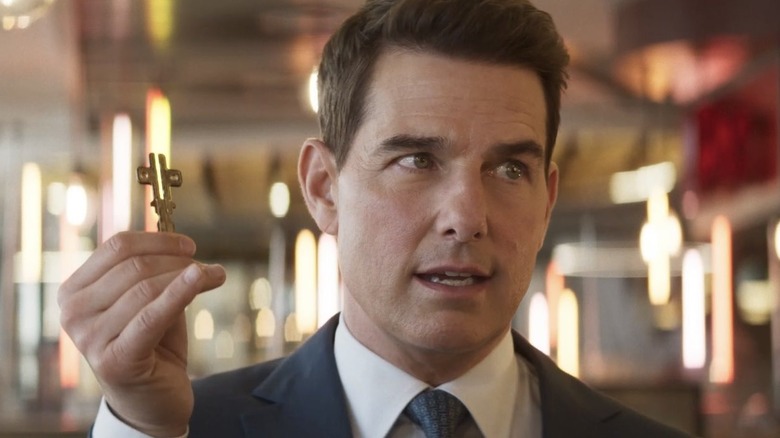Studios Rely On Big Franchises, And Irresponsible Budgets Are Kneecapping Them
Director James Cameron, the director of "Avatar" and "Titanic," is the unquestioned king of the box office, but he's also the first guy who made a movie with a $100 million budget. The movie in question was 1994's "True Lies" and, at the time, it was unheard of for a studio to spend that kind of money on a single film. Yet, nearly 30 years later, it's starting to seem like $100 million (inflation notwithstanding) would sound downright thrifty for a big-budget blockbuster from a major studio. That, dear reader, is a concerning prospect.
What has been happening, as of late, is an absolute explosion with budgets for Hollywood's biggest movies. More often than not, those movies are in pre-existing franchises, be it "Fast & Furious," "James Bond," or the Marvel Cinematic Universe. Now, before getting into the nitty gritty here, it's worth considering that yes, that pandemic had a huge impact on many Hollywood productions. COVID protocols and filming delays served to inflate budgets for several huge films. That having been said, the numbers we're seeing for movies like "Fast X" and "Mission: Impossible — Dead Reckoning Part One" are almost beyond comprehension. Things appear to be spiraling out of control.
Just how out of control are we talking? "Fast X" is said to carry a price tag of $340 million — before marketing! That instantly makes it one of the five most expensive movies ever made. But that's just the tip of the iceberg, as several other recent and upcoming franchise films have also seen their budgets balloon to outlandish heights. The real question is, why are studios letting this happen, and how can they put a stop to it?
A concerning trend
Just how far have franchise film budgets spiraled? 3 of the top 20 most expensive movies of all time will have been released between December 2022 and Summer 2023. 31 of the 100 most expensive movies ever produced have arrived within the last five years. Some recent highlights include "Avatar: The Way of Water," ($460 million) "No Time to Die," ($250 million), "Fast X," ($340 million), "Mission: Impossible — Dead Reckoning Part One," ($290 million), and "Star Wars: The Rise of Skywalker" ($275 million). One of the most outlandish? It was reported by Forbes that "Indiana Jones and the Dial of Destiny" will have a monstrous $300 million budget. For context, "Kingdom of the Crystal Skull" cost $185 million, and that was already incredibly steep.
Observers may care to note that many of these movies (the ones that have already been released anyway) managed to do quite well for themselves, with "The Way of Water" ranking as one of the highest-grossing movies ever at $2.28 billion worldwide. Plus, much of the investment in that movie will be rolled into "Avatar 3" and "Avatar 4." And yes, "Avengers: Infinity War" and "Avengers: Endgame" were astronomically expensive ($300 million and $400 million, respectively), but they were once in a lifetime exceptions to the rule. A price tag in the $300 million range should almost never be considered a good idea.
"No Time to Die" is a great example of why that is, as Daniel Craig's final go-around as 007 was said to need to make at least $800 million worldwide just to break even, not to mention turn a profit. For the record, it only made $760 million. In the end, it will eventually see profit thanks to cable rights, home video, etc., but the fact that a movie that makes that much money in theaters can still lose money is deeply problematic.
Not just big - totally out of control
To illustrate the issue here, let's go over some quick, rule-of-thumb movie math. Generally speaking for a big movie, the rule would be to double the production budget to account for P&A (print and advertising). So your average $150 million blockbuster like "Wonder Woman" would have a rough total cost of $300 million before seeing a dime of profit. Then, as far as box office goes, the other rough rule is that the studio will see half of that money actually returned to them, after theaters take their cut. "Wonder Woman" made $817 million at the box office, meaning Warner Bros. probably saw close to $410 million, making this a good investment.
One can see where that gets exceptionally tricky for something like "Fast X." Granted, Universal probably isn't going to roll out a $340 million marketing campaign, but you're still probably going to be close to $500 million invested before a single ticket is sold. So you're talking about a movie that might need to make $1 billion just to break even. In a world where very few Hollywood movies are making big money in China anymore, and with Russia essentially off the table in light of current events, that seems almost impossible to justify. Case in point, "F9: The Fast Saga" took in $720 million worldwide against a $200 million budget, compared to the $1.2 billion earned by "The Fate of the Furious."
It gets worse when we look at a franchise like "Mission: Impossible," a series that reached its high point with "Fallout" in 2018 ($787 million worldwide). How can Paramount expect to actually make money with a $290 million budget plus a pricey marketing spend for "Dead Reckoning"? These budgets end up completely defeating the purpose of investing in a big blockbuster film, which is supposed to make lots of money for the studio.
Simply put, this must be stopped
The plus side is that movie theaters still benefit all the same, as $1 billion in ticket sales brings amounts to $1 billion from moviegoers, whether or not the studio makes any money. Be that as it may, in an era when franchises are the key focus for just about every big studio in Hollywood, responsibility must come into play at some point. When a $200 million budget begins to look reasonable, it feels like we've truly lost the plot.
It's also all relative. Something like the R-rated "The Suicide Squad" seemed like kind of a questionable bet, being produced for $185 million after the original "Suicide Squad" was made for $175 million and earned $746 million worldwide ... but with a PG-13 rating, appearances by Batman and Joker, and Will Smith starring. Sure enough, "The Suicide Squad" topped out at just $168 million worldwide (though, admittedly, the pandemic was much more of a factor in summer 2021). Even so, it's an example of a budget being completely too large relative to the movie in question.
Studios absolutely rely on those franchises in an era when there is little certainty at the box office, but a movie is only as profitable as its budget and marketing spend allow it to be. This to say, if a movie is too expensive to make, even a gigantic haul at the box office may not be enough. These franchise films keep finding themselves in this unenviable situation — an inflated budget making it almost impossible to turn a profit. Hollywood, collectively, must address this issue sooner rather than later because when one of these overly expensive franchise films flops, it's going to be bad. This is simply not sustainable.



